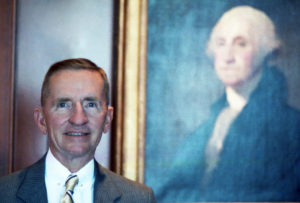Nurse Who Had Ebola Contends Dallas Hospital Violated Her Privacy
In a lawsuit filed Monday, nurse Nina Pham says that a colleague videotaped her without her permission and then the hospital released the tape to the media.
This piece originally ran on ProPublica.
This post was updated on March 3, 2015, to include additional comment from the hospital system, which was released after the story was published.
It was a touching scene, meant to buck up a hospital – and a community – shaken when one of its own nurses was infected with the Ebola virus.
Last fall, when Dallas nurse Nina Pham was about to be transferred for treatment from Texas Health Presbyterian Hospital in Dallas to the National Institutes of Health Clinical Center in Maryland, a doctor videotaped her farewell from her hospital bed.
“I love you guys,” Pham says, wiping away tears.
“We love you Nina,” the doctor replies.
The hospital released the video as it fended off accusations that it did not do enough to protect its staff after a patient who had contracted Ebola in Liberia sought treatment at Texas Health Presbyterian and died.
Now, in an interview with the Dallas Morning News published over the weekend, Pham contends she didn’t give permission for the hospital to record her or to make the video public. Pham filed a lawsuit Monday against the hospital’s parent company, Texas Health Resources (THR), claiming not only negligence related to her Ebola infection, but violations of her privacy. A federal patient privacy law, known as HIPAA, prohibits health providers from releasing information about patients without their permission.
“Never once did THR get Nina’s permission to be used as a PR pawn like this,” the suit says. “Never once did THR discuss its purposes or motivations or tell Nina what it was going to do with the information it sought from her. Instead, THR went to this young lady who was not in the position to be making any such decisions, and used her when she was in the darkest moment of her life, all for THR’s own benefit.”
Beyond that, the lawsuit contends, “Nina’s record was grossly and inappropriately accessed by dozens of people throughout the THR system.”
If the video was made and released without Pham’s permission, it would mark the latest and, perhaps, most unusual instance yet in which hospitals have gotten into trouble for allowing patients to be videotaped without permission. ProPublica reported in January about a dying man who was filmed without consent by a crew from the real-life medical TV show “NY Med.”
In her interview with the Morning News, Pham said that she told the hospital she did not want any information released about her condition. “I wanted to protect my privacy,” she said.
According to the article:
The day Pham was transferred to NIH, a notation was made in her medical file that “she does not have the mental capability to make end-of-life decisions,” [her lawyer Charla] Aldous said. But PR people from Texas Health were trying to talk to her for a media release “about how much she loves Presbyterian,” Aldous said.
Texas Health, with a PR firm’s help, developed a slogan — “Presby Proud” — aimed at restoring the community’s faith in the beleaguered hospital.
Pham alleges the doctor who videotaped her misled her about how the footage would be used. The article said:
Before Pham’s flight to Maryland on Oct. 16, she said, a doctor wearing a video camera under his protective hood came into her room and said he was filming her for educational purposes. Pham said she did not give permission for the video, which was released to the media.
“Thanks for getting well. Thanks for being part of the volunteer team to take care of our first patient,” a man’s voice said in the video. “It means a lot. This has been a huge effort by all of you guys.”
Pham, still lying in her Dallas hospital bed, got teary-eyed and said, “Come to Maryland, everybody.”
Asked about Pham’s allegations, a Texas Health spokesman sent the following statement: “Nina Pham served very bravely during a most difficult time as we all struggled to deal with the first case of Ebola to arrive in a U.S. hospital’s emergency room. Texas Health Resources has a strong culture of caring and compassion, and we view all our employees as part of our family. That’s why we have continued to support Nina both during and after her illness, and it’s why she is still a member of our team. As distressing as the lawsuit is to us, we remain optimistic that we can resolve this matter with Nina.”
Update: In an email to employees Monday evening, Texas Health chief executive Barclay Berdan said the chain “was sensitive to Nina’s privacy, and we adhered to HIPAA rules in determining what information to share publicly. We had Nina’s consent to share the information about her that was released.”
Has your doctor or hospital violated your privacy? Check out our news app and share your story.
ProPublica is a Pulitzer Prize-winning investigative newsroom. Sign up for its newsletter.
Your support matters…Independent journalism is under threat and overshadowed by heavily funded mainstream media.
You can help level the playing field. Become a member.
Your tax-deductible contribution keeps us digging beneath the headlines to give you thought-provoking, investigative reporting and analysis that unearths what's really happening- without compromise.
Give today to support our courageous, independent journalists.





You need to be a supporter to comment.
There are currently no responses to this article.
Be the first to respond.